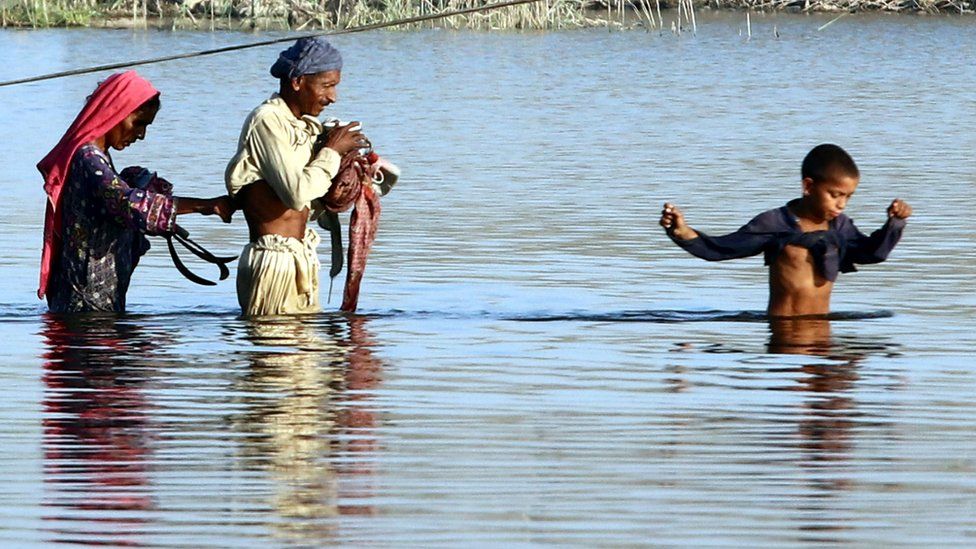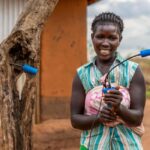The fight against climate change can become “a global mission for new jobs and clean growth”, Rishi Sunak will tell world leaders at the COP27 summit.
The prime minister will also say it is essential nations stick to commitments made at COP26 in Glasgow a year ago.
The UN’s climate change chief said a key aim to limit global temperature rises is “still within reach”.
Mr Sunak is making his first outing on the international stage in Egypt after becoming UK PM last month.
He arrived in Sharm el-Sheikh on Sunday night and will join other world leaders at the UN summit, including US President Joe Biden and France’s Emmanuel Macron.
Mr Sunak will unveil more than £200m funding to protect forests and for green technologies in developing nations.
He reversed a decision not to attend COP27 earlier this week after a backlash from opposition MPs and campaigners. He initially declined the invite as he said he was too busy preparing the November budget.
In his opening address on Monday, Mr Sunak will urge global leaders to “move further and faster” to avoid the worst impact of climate change by limiting global warming to 1.5C above pre-industrial levels.
He will say Russia’s invasion of Ukraine has “reinforced” the importance of ending dependence on fossil fuels, but will argue the move can give a boost to new green industries.
“The world came together in Glasgow with one last chance to create a plan that would limit global temperature rises to 1.5C. The question today is: can we summon the collective will to deliver on those promises?” he will say.
“By honouring the pledges we made in Glasgow, we can turn our struggle against climate change into a global mission for new jobs and clean growth. And we can bequeath our children a greener planet and a more prosperous future.”
Mr Sunak will also meet French President Mr Macron at the conference, where the topic of migrants crossing the English Channel in small boats is likely to be raised. The prime minister has said reducing the number of crossings is a “key priority”.
Downing Street said Mr Sunak will announce a further £65.5m for the clean energy innovation facility which provides grants to researchers and scientists in developing countries working on clean technologies – from biomass-powered refrigeration in India to lithium-ion batteries in Nigeria.
It said the UK will also commit £90m for conservation in the Congo Basin rainforest, and £65m to support indigenous and local communities.
But Labour’s Ed Miliband said Mr Sunak “had to be dragged kicking and screaming” to go to the summit and it was “implausible for him to claim the mantle of climate leadership”.
The shadow climate change secretary said the government should drop plans to issue more licences for North Sea exploration and end its opposition to onshore wind.
As COP27 got underway, the UN itself warned that meeting the critical target of limiting temperature rises to 1.5C would take an “extraordinary effort”.
“The science tells us that is it still within reach,” said the UN’s new climate chief, Simon Stiell. “We cannot lift the pressure.”
Speaking to the BBC World Service’s Newshour programme, Mr Stiell said just 29 states had strengthened their climate pledges since last year, which was “not enough”.
His remarks came after the UN’s weather and climate body released a report showing that the rate at which sea levels are rising has doubled since 1993.
UN Secretary-General Antonio Guterres described the report as a “chronicle of climate chaos” and urged governments at COP27 to answer the planet’s “distress signal” with “ambitious, credible climate action”.

Global temperatures have risen 1.1C and are heading towards 1.5C, according to the UN’s climate scientists, the Intergovernmental Panel on Climate Change (IPCC).
If temperatures rise 1.7 to 1.8C above 1850s levels, the IPCC estimates that half the world’s population could be exposed to life-threatening heat and humidity.
Rich countries are also falling short in providing the finance needed to help developing nations adapt to a changing climate and develop cleanly, the UN has warned.
But Mr Stiell said the conference was off to a “hopeful start” after developing nations successfully lobbied to put on the agenda the thorny issue of “loss and damage”.
This debate revolves around compensation money paid by wealthy countries to the states worst affected by climate change.
Speaking to the BBC, David Panuelo, President of the Federated States of Micronesia, said bigger nations needed to “come good with their nationally-determined contributions”.
Highlighting China, India, Mexico, Indonesia and Brazil, Mr Panuelo said there are “many countries that need to come forward with… commitments to help meet this challenge that global communities are facing now”.





